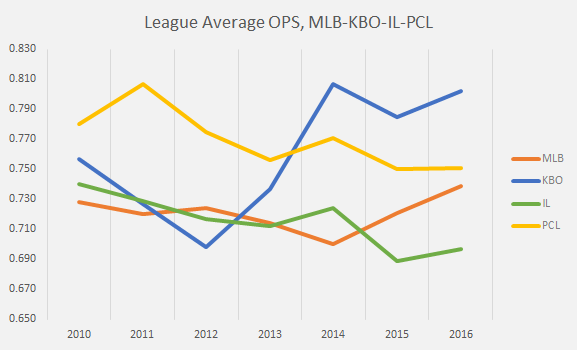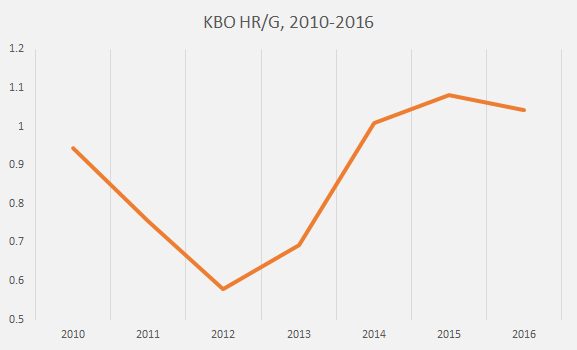Per Andrew Baggarly:
The club has agreed to terms with Korean infielder Jae-gyun Hwang on a minor league contract that includes an invitation to major league spring training.
Baggarly goes on to note that Hwang’s contract is for $1.5M if he makes the major league roster and he will be invited to spring training. Hwang, 29, is coming off a .330/.391/.558 season for the Lotte Giants of the Korean Baseball Organization (KBO). He hit 22 doubles, 3 triples, 26 home runs, and walked 47 times to 64 strikeouts. That’s all fine and dandy, but this is the part where I tell you much of a crazy hitters league the KBO is.
Consider the following:
- Hwang’s .949 OPS placed him as the 19th best hitter in the KBO.
- The KBO had six (six!) hitters with an OPS of 1.000 or greater. The majors had one (David Ortiz) in 2016.
- Among all types of professional and independent baseball leagues, it’s hard to find a league that’s more offense-friendly than the KBO.
League context matters a good bit.

And while Hwang’s spike in power is at least quasi-interesting, it appears more to be a reflection in the changes in the KBO’s high octane run-scoring. Consider this additional line graph of home runs per game in the KBO from 2010-2016.

In 2016, the KBO averaged 1.04 home runs per game; for comparison in 1999 the average home runs per game in MLB was an even more ridiculous 1.14 per game. Ex-Giant, and former KBO pitcher, Ryan Sadowski, actually wrote a little bit about his time in the KBO. It’s a good read for a guy that pitched in both the majors and the KBO for three years. (He talks about the changes in the ball and the decision to let more foreign-born players in the league as potential reasons for the influx of offense.)
So, this is all a long winded way of saying that you really can’t take KBO numbers at face value. As always, league context applies heavily. I am sure there are smarter people out there that have worked on translations between the leagues, and it would be very interesting to see. Hwang joins more Korean players as they make their way to the majors. The good news for Hwang and the Giants is that there really is no risk here. Hwang is young enough at 29 to not be too far past the 27-28 peak for ballplayers. Also, from what I can find, his defense seems passable. You really can’t write about Hwang and not bring up this legendary bat flip. Dude has 80-grade bat flip ability.
It’s likely that he’ll be more of a bench piece/non-factor, but kudos to the Giants for being creative in trying to fill a team need. He’s going to be a spring training storyline that’s actually worth following.